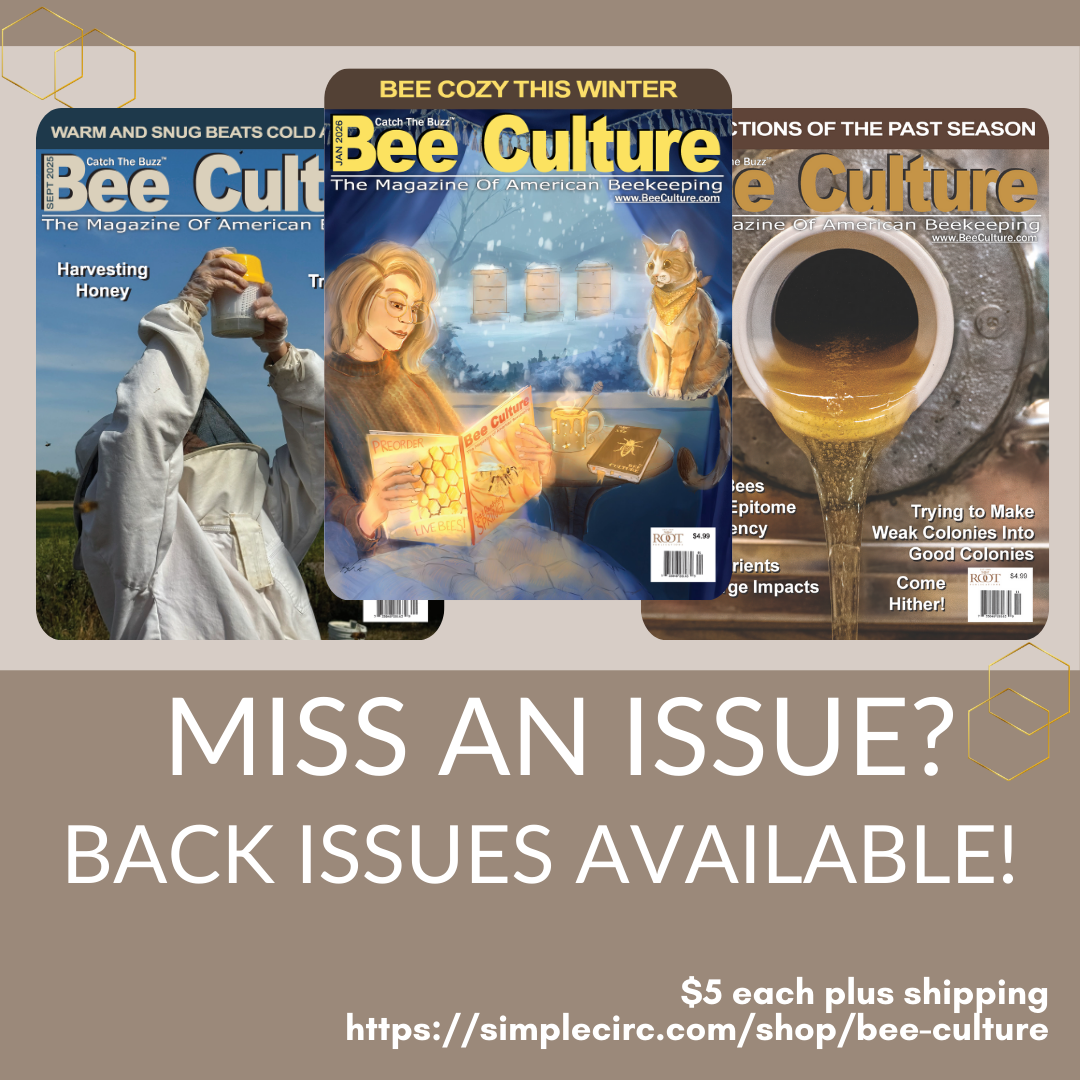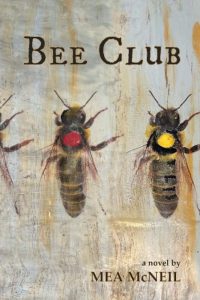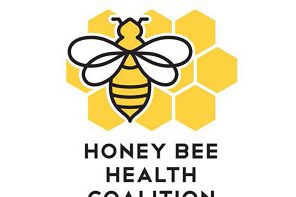by Eugene Makovec
Remember that old movie, “Mr. Smith Goes to Washington”? Me either, but it had something to do with Jimmy Stewart going to Congress, fighting corruption and striking a blow for the common man.
Well, this year Mr. Makovec went to Jefferson City, and I’d like to think my colleagues and I struck a blow for the state’s beekeepers. Maybe that’s where the similarity ends. I did not encounter any blatant corruption – well, unless you count a committee chairman asking if we’d brought any honey (we had) – and all of the legislators we met seemed genuinely interested in making their state a better place.
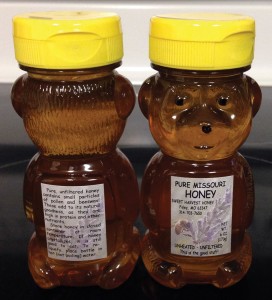
But what I did find was a system mired in futility, where a simple bill with virtually unanimous support can barely make it through the process in over three months’ time. Redundant committees, repetitive votes and unrelated amendments all conspire to slow down or even derail legislation. As someone told me at the outset, “There are 19 ways to kill a bill, and only one way to pass it.”
I’m sure the filibuster was one of those 19 ways, but I doubt that “sex scandal” was on his list. Things were already touch-and-go heading into a congested last week of the session, but it was ultimately a combination of those two scenarios that nearly ended our chances.
The Health Department cracks down
First, a little background: Missouri, up until this year, was one of quite a few states that classify honey as a processed food, and regulate it as such. Little known to most of the state’s beekeepers, we had a law on the books requiring all honey for third-party sale to be extracted and bottled in an “inspected kitchen”. Beekeepers with less than $30,000 in annual sales were exempt from this requirement IF they sold honey only “to the end consumer”. This meant handing the bottle directly to that consumer – not selling via internet, not handing off to a friend for delivery, not taking orders at a market for later shipment. In addition, the container had to be labeled, “This product has not been inspected by the Department of Health and Senior Services.” (When selling at a farmers’ market, craft fair or other such venue, a prominent placard with that warning was also required.)
I learned this the hard way last August when I got a call from my county health inspector, who informed me she had just removed my honey from the shelves of a local market, as she had no record of my company, Sweet Harvest Honey, having an “inspected kitchen”.
The call surprised me for a couple of reasons. First, I’d had honey in that store for most of the previous year without incident. Second, Lincoln County, where I have lived now for about three years, is well-known in eastern Missouri for having few standards for anything. (Your old fridge quit on you? Just drag it to the front lawn until such time as you find another use for it.)
So I told her, “I wasn’t aware that Lincoln County had any rules like that.”
“Oh, it’s not Lincoln County,” she replied, but the state of Missouri. She could not even cite the law in question, but gave me a phone number for the state inspector for the St. Louis region.
I told her that my honey had been in this store for quite some time, and asked if her action was in response to a complaint of some sort. No, she answered, “the state has been training us” on enforcement of their law. She again suggested I call the state inspector.
It took Virginia Phillips about a week to return my calls, and while she was polite, she showed no sympathy for my situation or my arguments. “What’s the difference,” I asked, “between the honey I sell to you directly and what I sell to a store to sell to you?” When you sell directly, she responded, your customer can ask you questions about the product.
I told her that in almost 20 years I have fielded lots of questions about my honey, both directly and through retailers, but they have NEVER been related to health or safety. Rather, they fall into the categories of:
Where are your bees located? (How “local” is this honey?)
Why is this honey a different color than what I bought last Fall?
Why does your honey taste so much better than what I buy in the supermarket?
Can I buy it by the gallon?
We also discussed the language of the law in question, which repeatedly referred to the “processing” and “manufacturing” of honey. “I’m not processing anything,” I said, explaining that honey is a finished product once the bees cap it. “And bacteria cannot even live in honey.” There is no reason for it to be covered under processed food regulations, I argued, which are designed to prevent the growth and spread of bacteria.
“My husband and I used to be beekeepers,” she responded. “I know how proud you are of your product.” She added that she would be happy to explain the law to my local beekeeping club.
“As it happens,” I said, “I am currently the president of Three Rivers Beekeepers, which meets in St. Charles County.” I put her in touch with our program director, who set her up for our November meeting.
Some weeks later, in mid-September, I used my bully pulpit at Three Rivers to rant about this law and its repercussions. After the meeting I heard from a couple of other beekeepers, also in adjoining Lincoln County, who had been affected by the recent crackdown. My companion tirade on the Missouri State Beekeepers Association’s Facebook page prompted the MSBA to schedule Ms. Phillips to speak at its Fall Conference in October.
Her message there was not well-received. Most attendees had not been aware of the regulations, but a handful lived in counties that had recently begun enforcement. Some expressed the same incredulity as I had, asking what the difference was between the honey they sold at their doorstep and what they delivered to the corner market. And like me, they weren’t buying her explanation. When someone asked her to cite health concerns from unregulated honey, the best she could come up with was botulism. Even then, she admitted to a questioner that an inspected kitchen would do nothing to prevent it.
By the way, the Centers for Disease Control and Prevention reports an average of 145 cases of botulism per year in the U.S., two-thirds of which occur in infants. Only about a half-dozen are fatal. Botulism spores are present in dirt and dust, and thus can find their way into any number of natural, uncooked foods. There is no evidence that it is more prevalent in honey than in lettuce or corn syrup. And in virtually everyone over six months of age these natural doses cannot survive our digestive system and so are harmless. Many beekeepers include a warning on their honey to avoid feeding it to infants under one year of age, though curiously there is no mention of this in Missouri’s (or most states’) honey regulations.
As for the kitchen requirements, Virginia couldn’t really define them for us, but after a running game of “20 Questions” we determined that it included three or four sinks, washable walls, a floor drain, covered lights and an adjoining bathroom – all with a plumbing/septic system separate from that of the primary residence. We later learned that this lack of a clear definition made for different rules from county to county.
Ms. Phillips did not show up for her scheduled appearance at Three Rivers in November, explaining a few days later that she’d forgotten due to an illness in the family. But as luck would have it, her predecessor in that position had come to hear what she had to say, and offered to stand up and speak in her stead. (He’d purchased honey at Isabee’s bee supply store, owned by Three Rivers board member Jane Sueme, and she’d had a discussion with him about the regs.)
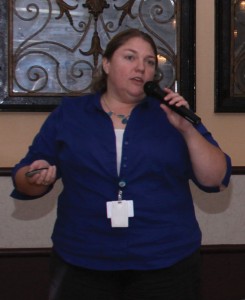
MO Health
Inspector Virginia Phillips defends the state’s honey sales regulations at the 2014 Fall Conference of the Missouri State Beekeepers
Association. Her presentation was not well-received.
(photo by Eugene Makovec)
He began by citing two incidents: The 9-11 terror attacks and the Tylenol tampering scare of the 1980s.
I raised my hand. “Would either of those incidents have been prevented by an inspected kitchen?”
“No,” he admitted.
We proceeded to educate him on the nature of honey and how it is extracted. He candidly told us that we would get nowhere with the folks at the health department. If you want to change the enforcement, he advised, you’ll need to go the legislature and change the law.
Gaining access
My incoming state senator, Jeanie Riddle, had just been elected two weeks before, and wasn’t taking office till January. I sent a detailed email to the old state rep office she was vacating, but did not get an answer. In the meantime, we formed a committee at Three Rivers to look into our options. We learned that Illinois’s beekeepers had just gotten their law changed in 2010, classifying honey as an agricultural commodity outside the purview of the state’s health department, and thus exempt from its food processing regulations (except for producers of more than 500 gallons per year). So since our current law applied to “jams, jellies and honey”, our goal was to remove honey from that statute and write a new one giving Missouri’s beekeepers a broad exemption similar to that enjoyed by our neighbors to the east. We also mailed a letter to the Missouri Department of Health and Senior Services, asking for a list of cases where honey was linked to food-borne illness. We did not expect to hear back from them, and figured on using that non-response against them down the road.
On January 17th, I took our case to the MSBA Executive Board, of which I am a member as Newsletter Editor. The Missouri legislative session ran this year from January 7th to May 15th. But I was told by a couple of people on the board that if my bill had not already been introduced – just 10 days into the session – I might as well wait until next year!
I’d often read about all the bills that didn’t make the cut at the end of a session, but I always figured these were controversial or just introduced late in the game. Who knew that “late in the game” meant mid-January?

Label Challenge – find room for the statement, “This product has not been inspected by the Department of Health and Senior Services.” (photo by Eugene Makovec)
I learned this year that bills can actually be “pre-filed” as early as December 1, and in fact over 180 Senate bills were filed before the 2015 session even began.
So the MSBA board shelved the issue for the time being, with an eye toward trying to pass something in 2016. I went home discouraged, but two developments quickly got our efforts back on track.
First, I got an email from local beekeeper Kevin Flynn, who informed me that he knew Senator Riddle’s legislative aide, Zach Monroe, and offered to put me in touch. I emailed Zach the particulars, and he responded to say he’d look into the issue. Riddle’s office called in late January and we set up a meeting for February 13th.
The second development was a January 23rd letter from Health and Senior Services informing me that, under the Sunshine Law, they had the right to charge me $21.38 per hour for research and ten cents per page for their findings! I called and said we had no intention of paying for such results, but after being transferred a couple of times I was told that I would first receive a bill and have the option of paying for the results. But just two weeks later came their official response, stating, “After review, it has been determined that the Department has no records showing honey as the cause of any food-borne illness.” Even better, this letter showed up on the morning of my meeting with Senator Riddle!
We met in Kevin Flynn’s office, and I was already thinking in terms of 2016, but the Senator said no, we can get something done this year. In fact, she said, Zach already had a plan of attack: Rather than remove honey from the “jams and jellies law”, it would be simpler to remove jams and jellies from the “honey law”. Jams and jellies were already covered under a “cottage foods law” passed the previous year, so there was no need to cover them here, he said, and it would be an easier task to pass a revision to an existing law than to start over.
So we spent an hour hashing out the details, with Jeanie and Zach speaking in terms of what we could get passed, and me stating what I thought beekeepers could live with. For example, I would have liked to remove the $30,000 threshold altogether, arguing that “it’s the same honey” whether I make 29 grand or 31. Barring that, I suggested changing it to 500 gallons like in Illinois, as that is a constant that will not lose value with inflation.
But Zach asserted, “You’ll never get something passed without a financial cap separating beekeepers like you from the big commercial producers.” The good news, he said, is that the cottage foods law has a threshold of $50,000, so we can increase it to that without raising eyebrows. I went along, as that would raise it to an equivalent of about 800 gallons and allow for a few years of inflation.
The label change was a thornier issue. Both Jeanie and Zach felt that removal of the “not inspected” disclaimer would unduly complicate things and be more difficult to justify. But I wasn’t budging on this one, arguing that not only would this 14-word statement take up valuable real estate on my label (I handed them a 6oz bottle to illustrate my point), but such a warning goes against our basic premise that honey is inherently safe. Finally the Senator suggested we remove the disclaimer and see what happens; we can always put it back in, she said, if that’s what it takes to get the bill passed. I agreed.
“Other than the health department, who do you think will oppose this bill?” I asked them.
“Urban legislators,” responded Senator Riddle without a second thought. She was very surprised when I told her that the majority of the state’s beekeepers now live in urban and suburban neighborhoods.
By my request, Zach wrote up the bill and sent me a draft on February 16th for comment. I wheedled a promise to change the terms “processing” and “manufacturing” to “harvesting” and “bottling”, and forwarded it to the MSBA board, which voted unanimously via email to approve the language. Senator Riddle introduced it as Senate Bill 500 on February 24th.
Zach suggested that I contact House Ag Chairman Jay Houghton and ask him to sponsor an identical bill in the House. As the Chairman would not return my calls or emails (presumably because I’m not in his district), I contacted my own representative, Randy Pietzman, who had just taken office himself but prevailed upon Mr. Houghton to introduce House Bill 1093 on March 3rd.
The gauntlet
Mark Twain famously said, “No man’s life, liberty, and property are safe while the legislature is in session.” And frankly, most of the things our legislators pass are bad laws, so we shouldn’t make it easy for them. Having said that, some of the issues a bill can encounter are well beyond simple checks and balances.
For example, in the Missouri House we have an Agriculture Policy Committee, consisting of 18 members whose job it is to hold hearings and take public testimony on Ag-related bills before sending them on to the full House for debate. But beginning in 2015, we also have a Select Agriculture Committee, whose purpose is ostensibly to provide another layer of “quality control”, thus ensuring that such Ag bills are doubly vetted before taking up valuable time on the House floor. I say “ostensibly” because six of the Select Committee’s 11 members are also on the Policy committee – so they are in effect overseeing themselves! Further, as we learned later in the session, this extra committee affords legislators one more chance to tack on amendments before the bill reaches the floor.
Many readers may remember the old Schoolhouse Rock cartoon, “I’m Just a Bill”, describing how a law is enacted at the federal level. The process is similar in most states. In Missouri, the following steps are needed:
First Reading: The bill is introduced on the floor of the Senate. (The process is the same in the House.)
Second Reading: The bill is assigned to a committee for discussion.
Committee Hearing: A hearing is held where the sponsoring legislator introduces and argues for the bill, and members of the public are allowed to testify for and against. Committee members then hold an “Executive Session” and recommend the bill “Do Pass” or “Do Not Pass”. “Do Pass” sends it to the full Senate for debate.
Perfection: The bill is brought up for debate, possible amendment and a vote. If it passes it is considered “perfected” and is printed for distribution.
Third Reading: The bill is brought up once more for an official roll call vote. If passed it is sent to the House, where the whole process is repeated. If that chamber passes the bill, it is pronounced “Truly Agreed To and Finally Passed” and sent to the governor for his signature or veto. A veto can be overridden by two-thirds votes in both chambers.
If the House amends the bill, the Senate can choose to: Take it back through committee and pass it in its new form; reject the changes and return it to the House; or request a conference committee to hash out the differences. The results of that committee would need to be debated and passed by both chambers.
I’ll bet that if you look carefully your state’s process is as complicated, and frustrating.
The MSBA gets to work
Once the bills were introduced, we assembled a team of five beekeepers from strategic areas of the state to testify in upcoming Ag committee hearings, which were held on March 17th and 18th in the House and Senate respectively. We coordinated our statements, each under three minutes, to hit upon various aspects:
I provided the overview, telling the story of my honey being pulled from store shelves due to a processed foods law that I didn’t even know existed – a law designed for jams and jellies, which, unlike honey, are in fact processed foods and subject to bacterial growth and spoilage if not properly handled. I closed by quoting from the Health Department letter and concluded, “Enforcement of this law solves a problem that does not exist.”
Mike McMillen was next, and talked about the various trials and tribulations that bees and beekeepers face these days, and how difficult it is to keep our heads above water as it is, without the government making things more difficult.
Charlotte Wiggins told them about the enormous contribution that beekeepers make to Missouri’s Ag economy.
Bruce Snavely gave a rundown of the regulations for a commercial kitchen and how it cost one beekeeper in his area over forty thousand dollars to comply.
And Cathy Misko detailed the wide-ranging health benefits of honey – especially local honey – and what an important role it plays in our urban and suburban economy.
We were a bit taken aback by the overwhelming support we received from committee members, in both houses and from both parties. “Isn’t honey, like, the perfect food?” asked one representative. “It’s my understanding that honey never spoils,” remarked another.
We did experience one hiccup on the House side, when a woman rose to speak in opposition. She represented a group of health professionals, and took issue with the labeling change. Her contention echoed that of Virginia Phillips last August: It’s one thing for someone to buy in person from the beekeeper, who they can ask questions about the product, but people assume that food they buy in stores has been inspected by a government agency, and they need to be informed if that is not the case. And unfortunately, since Chairman Houghton had never spoken to us before introducing the bill, he could not answer the question of why we were making the change!
Luckily, the committee allowed me to speak again “for informational purposes”. I argued the same points I’d made to Ms. Phillips, and the committee seemed convinced. In fact, both House and Senate committees voted unanimously “Do Pass” to advance the bills. SB 500 went to the Senate floor calendar, while HB 1093 went to the Select Committee, which also passed it unanimously and sent it to the full House.
Once again, we were amazed by the ease with which both bills sailed through. HB 1093 passed the full House on April 20th by a vote of 150-2. SB 500 passed April 21st by 31-2.
Since the bills were identical, I thought that was the end of it – but discovered to my dismay that, since these were technically separate bills, each was only halfway there; one would need to make it back through the entire process in the opposite house to become law. So with three weeks to go in the session, the calendar became our primary opponent.
Once again each bill passed one committee. But while HB 1093 was placed on the Senate calendar, SB 500 first had to clear the House’s aforementioned oversight committee, and this time its members chose to load it up with a slew of unrelated amendments. With just 10 days to go at that point, it was essentially a death sentence.
I called Jay Houghton’s office and asked his assistant: Is there any way the Chairman can bring this to the House floor, strip the amendments and pass it in its original form? Her response: Work with the Senate to pass HB 1093.
But with one week to go, the Senate effectively shut down due to a fight over Right-to-Work legislation. The Republican leadership had made this anti-union bill its highest remaining priority, while the Democrats’ primary goal was stopping it. The latter party threatened a filibuster, and the GOP used Senate rules to cut off debate and force a vote. So on Tuesday morning, with the session ending on Friday, Democrats announced a rolling filibuster – an end to legislating for the year. When MSBA President Valerie Duever called me that afternoon for an update, I told her it was over.
But by the time I got home from work that night, I’d decided to keep fighting. I sent email blasts to some 1500 Missouri beekeepers, posted to the MSBA Facebook page, and asked our Regional Directors to contact the local clubs in their areas, all with this final plea: Contact your Democrat senators and ask them to reconsider the filibuster, and contact House members of either party asking that they push to bring SB 500 to the floor, strip the amendments and pass a clean bill.
But the next morning, things took an unbelievable turn for the worse. The Kansas City Star broke a story about the House Speaker’s dalliance with a 19-year-old intern. The House shut down for two days, during which time the Speaker resigned and a new leader was elected. The new boss reconvened Friday afternoon with a vow to get some work done.
Evidently the state’s beekeepers had come through with their calls and emails. With hundreds of bills still in the queue, Senate Bill 500 was the 14th of just 32 to be passed during the session’s final flurry. Rep. Houghton, who we later learned was himself responsible for one of the committee amendments, argued for their removal, and after a lengthy debate on policy and procedure, the bill was passed 141-5 in its original form. We had won!
Governor Jay Nixon signed the bill on July 10th. The new law took effect August 28th.
Lessons learned
As I researched our options and made inquiries of beekeepers in other states, there were several things that surprised me: For one, Missouri is by no means alone in its treatment of honey and beekeepers. In fact, the language of the law we were protesting seems to be pretty standard fare: They are almost universally written as exemptions to strict commercial kitchen requirements – provided that beekeepers:
Sell only direct to consumer
Label their honey with some version of “produced in a kitchen not inspected by the health department”
Remain under some arbitrary annual sales or quantity threshold – commonly 500 gallons or some roughly equivalent dollar amount ($30,000 in Missouri)
The problem is, this direct-to-consumer requirement prohibits the vast majority of a state’s beekeepers from selling their product through their local grocers, health food stores, corner markets, gas stations, feed stores – all the places that consumers go looking for that local, raw honey from local beekeepers. And while the premise for this requirement is to protect the public from “un-inspected” honey, it does not apply to honey brought in from out of state, or even out of the country.
So you end up with a curious situation where, for example, Missouri beekeepers can sell their honey across the border in Oklahoma, and Oklahoma beekeepers can do the same in Missouri, but neither can sell to shops in their own neighborhoods. Meanwhile, Chinese honey, with its sordid history of adulteration and chemical residues, can be sold with impunity in both states. If unregulated honey is in fact a threat to the citizenry, we’re doing a pretty poor job of protecting them!
A bigger surprise was that most of the beekeepers I talked to in states with similar rules seem to accept them without question. A couple even bristled at the idea of “lowering the standards” by reducing our regulatory burden! A Texas beekeeper decried that state’s recent loosening of the law as opening the door for adulteration and other practices that will give the rest of us a bad name. But who is more likely to adulterate honey, I asked him – the local beekeeper who delivers his own product to the corner market, or the guy a thousand miles away who ships it in via distributor and stands no chance of ever meeting the end user?
But what truly amazed me was that, after accounting for the long, drawn-out legislative process and some truly unexpected roadblocks, changing the law was easy! We encountered virtually no opposition from legislators of either party, and the Health Department didn’t even weigh in.
And no wonder: After close to a decade of wall-to-wall media coverage about CCD and such, honey bees and beekeepers are loved and appreciated like never before. There is no reason that other states’ beekeepers should not be able to do what we did in Missouri.
Of course, there’s no guarantee you won’t hit roadblocks of your own. And state officials may take a more active role in opposition. But consider: On one side we have health department bureaucrats, trotting out the usual, tired arguments about public health and safety, but with nothing to back them up. And on the other are the intrepid beekeepers – stalwart friends of the environment and protectors of the food supply – struggling to survive against ever-increasing odds and now being told that they cannot even sell the fruits of their labor.
We’re gonna win that battle every time.
Photos 1-4 by Eugene Makovec. Photo 5 by Diane Makovec.






